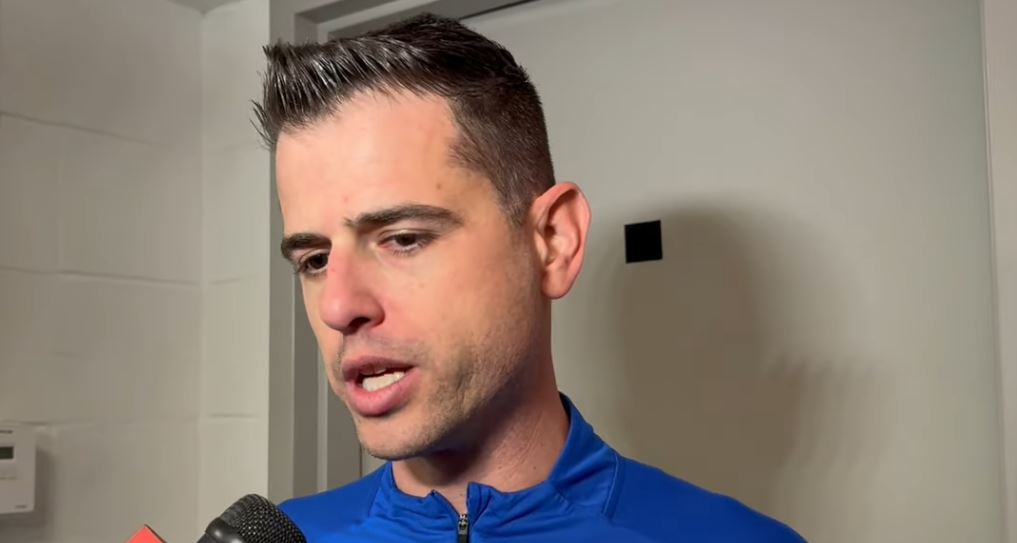The University of Florida made an investment in a vision when they brought head coach Todd Golden to Gainesville in 2022. He had just finished a successful stint at the University of San Francisco, a mid-major program where he had quietly established himself as one of the brightest minds in college basketball. There was no fanfare or fireworks when he arrived in Florida, but what followed was a transformation that has been incredibly successful and financially enlightening.
Golden’s initial six-year, $18 million contract expressed cautious optimism. The Gators decided to support a relatively unknown individual with novel ideas and a data-driven philosophy rather than pursuing well-known coaches with extravagant salaries. In retrospect, that choice seems remarkably similar to how some of the most creative tech companies wager on high-upside engineers rather than seasoned veterans. It’s a calculated risk that is already paying off in this instance.
| Todd Golden – Profile Snapshot (2025) | |
|---|---|
| Full Name | Todd Raymond Golden |
| Date of Birth | July 7, 1985 |
| Age | 39 |
| Nationality | American |
| Current Position | Head Coach, Florida Gators Men’s Basketball |
| Playing Background | Saint Mary’s (NCAA), Maccabi Haifa (Israel) |
| Initial Florida Contract (2022) | 6 years, $18 million |
| 2024 Contract Extension | 2 additional years, escalated salary to $4M annually |
| 2024–25 Base Salary | $3.6 million |
| Annual Raise | $200,000 per year |
| Potential Annual Bonuses | Up to $400,000 based on performance |
| Retention Bonus (April 2025) | $500,000 |
Todd Golden’s rise is indicative of a subtle shift in the current NCAA coaching economy, one that values adaptability, analytics, and leadership that is grounded in substance rather than legacy. Golden’s on-court performance greatly exceeds those numbers, even though his salary is ranked 12th out of 15 public SEC coaching salaries. The gap between rank and return is especially noticeable in 2024, when the Gators had their best conference performance since 2017.

In addition to rewarding achievement, Golden’s 2024 contract extension demonstrated the coach and university administration’s strategic alignment. Florida was able to create a contract that is very effective at promoting both retention and results by incorporating performance bonuses and gradual raises instead of frontloading pay. Golden will make $4.6 million by the end of his contract, putting him in line with SEC heavyweights like Rick Barnes and Bruce Pearl.
The pay scale for Golden is noticeably tiered. He gets about $250,000 in supplemental pay in addition to his base salary of $3.6 million for the 2024–25 campaign. Additional performance bonuses, worth up to $400,000 annually, are linked to advancement in the NCAA Tournament, SEC Tournament victories, and seasonal honors. These are not insubstantial figures. He barely missed out on a $25,000 bonus for SEC Coach of the Year, which went to Bruce Pearl, and received $37,500 for making it to the NCAA Tournament just the year before.
His agreement is especially novel because it includes retention bonuses, which are a tactic frequently employed by tech companies to hold onto top talent. Golden will receive a $500,000 retention bonus if he stays in the program through April 15, 2025, demonstrating the university’s commitment to continuity. By combining short-term recognition with long-term vision, Florida has created a compensation model that other organizations may soon try to imitate.
Additionally, Golden’s story touches on more general sports narratives. Audiences who are drawn to tales of upward mobility will find resonance in his quick ascent from assistant coach at Columbia and Auburn to a successful stint at San Francisco and, most recently, a Final Four appearance at Florida. It’s similar to witnessing a minor leaguer who was passed over by scouts eventually break into the major leagues and perform brilliantly under duress.
Florida’s treatment of Golden is similar to how teams have started to see coaching hires as culture builders rather than just replacements. Furthermore, Golden’s impact goes well beyond Xs and Os. He is changing the definition of contemporary college basketball leadership by incorporating advanced data analytics, placing a strong emphasis on player development, and updating recruiting tactics. This is especially helpful in an environment where programs are increasingly focusing on holistic development and coaching styles are being examined more thoroughly than before.
When contrasting Golden’s career path with the larger SEC coaching landscape, this change becomes even more obvious. At Arkansas, John Calipari continues to hold the top spot with a salary of $8 million, while coaches like Chris Beard and Nate Oats make about $5 million. Few, however, have elevated a program from mediocrity to elite status so quickly. Golden has led the Gators to their most successful offensive season ever, averaging 84.9 points per game and leading the nation in rebounds. He has a 67–33 record over three seasons.
The lack of business endeavors in Golden’s financial story is especially intriguing. In contrast to many well-known coaches, he does not appear to have any corporate board memberships, endorsement deals, or high-profile speaking engagements associated with his name. He has instead forged a quiet, orderly path, emphasizing relationships, rebuilding, and results. In recent interviews, Golden has made that subtle profile very evident, attributing a large portion of his success to Bruce Pearl’s mentoring and his cooperative relationship with Florida’s athletic department.
Adversity on a personal level has also entered the story. Golden’s momentum was momentarily halted by accusations in late 2024, but he was able to regroup, stabilize the program, and guide his team all the way to the NCAA Tournament. His resilience and emotional leadership, which are qualities frequently disregarded in conventional coaching metrics, are demonstrated by his ability to endure outside pressure while retaining performance.
In addition to earning financial rewards, Todd Golden has changed the way a new generation of coaches could advance in college athletics by focusing his strategy on both vision and execution. His impact is especially apparent among up-and-coming assistants, who now view his path as a workable one—characterized by modesty, creativity, and astute strategic thinking.
In the future, more contract modifications might be required if Florida keeps improving under Golden’s direction. Professional franchises and even bigger programs might approach. Florida will face a cultural as well as financial challenge. Maintaining Golden might necessitate more than just financial support; it might also call for a sustained alignment of opportunity, vision, and values.
